Executive Director Jon Bellish explores an often overlooked actor within the peacebuilding process who can successfully bring implementers and donors together and help avoid common development pitfalls: "The Broker."
The theme of World Oceans Day 2020 is #ProtectOurHome. What does that mean in the Somali region? Students of marine science participating in the fisheries catch data collection project, Project Kalluun, are ocean stewards and leaders in conservation. We asked the students what they love about the ocean and what the people and leaders of the Somali region can do to protect it. These are their words.
Halkudhiga Malinta Badda Adunka waa #IlaaliGurigeena. Maxay tasi ula macnatahay Somalia? Ardayda Barata Cilmiga-badda oo qaybna ka ah mashruca Project Kalluun waa # waa ilaaliyayaasha iyo hogaamiyinta daryeelka badda. Waxaan waydiinay ardayda waxay ay ku jecelyihin badda iyo waxa dadka iyo madaxda Somalida samayn kran si loo ilaaliyo Badda. Kuwani waa ereyadooda.
by Laura Burroughs and Jamal Hassan
Eighteen Somali fisheries officers and data enumerators are leading a pioneering fisheries data collection project - the first since the country’s civil war. The project, known as the Fisheries Data Collection Working Group (FDCWG), is a nation-wide fisheries catch data collection program that seeks to produce national estimates of fisheries catch and economic contribution. It spans six landing sites and is supported by SF and FAO.
Those working at the landing sites are incredibly knowledgeable about their coastal ecosystems and quickly picked up a knack for data collection. After only eight months, data collectors identified and counted over 31,000 fishes and collected length and weight data on 8,400 fishes. They accomplished this by surveyinging three boats per day, three times per week, at each fish landing site. This ongoing project is a substantial effort, but they see the bigger picture: the contribution of their efforts to generate the information necessary to protect their coastal resources. Through the process of measuring and weighing fish, they are providing the first steps toward effective fisheries management informed by national-level data collection.
To better understand the impact of this project, Secure Fisheries interviewed two contributors to learn about their experiences. In 2019, Gani Hassan and Mohamed Gacal were hired for the FDCWG. Gacal is the project assistant; he is in charge of data entry and quality assurance, and he contributes to data analysis. Gani is a landing site data collection coordinator; she oversees the data collection work of her two data enumerators, submits completed data forms to Secure Fisheries, and collects data alongside the enumerators in the field.
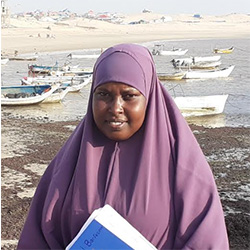
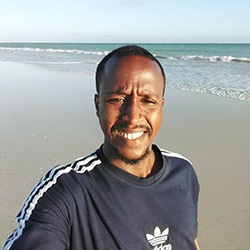
Landing site data collector Gani, left, and project assistant Gacal, right
Gani was born in Kismayo and holds a medical degree from Kismayo University, and a certificate in Business Administration. She worked for UNICEF in a pediatric ward and taught high school math and Somali language courses. In 2017, Gani became involved in the Somali fisheries sector through a project with GIZ and the Jubaland Ministry of Fisheries in Kismayo where she volunteered to collect data. Gani’s experiences collecting data have led her to become very interested and invested in the Somali fisheries sector.
Somali born, Gacal grew up in the United Arab Emirates. He returned to Mogadishu and achieved a degree in marine science from City University of Mogadishu. The program solidified his passion for Somali fisheries and he hopes to continue his studies through a postgraduate degree.
Both have learned important skills through the data collection activities. There are some very technical aspects to these roles, including fish identification and accurate fish measuring that have enabled Gani and Gacal to build their knowledge of Somali fish and hone important fisheries research skills. The skills they have developed are often put to the test when the data collectors encounter challenges in their work. For example, identifying fish is a difficult task that requires careful observation to distinguish between different species. Team members must also have a high level of patience and commitment. The data collectors sometimes wait on the beach for six hours before the first fishing vessel arrives.
This project has also highlighted broader challenges to the Somali fisheries sector, such as trust between resource users and government. At Lido Beach, a fisher accused Gacal of collecting catch data for the Turkish Embassy. This was an extreme case of mistrust, but it highlights some of the initial suspicion around data collection. There is a need to develop trust among resource users, scientists, and government officials. Gani also emphasized that trust is a vital component for a successful and long-lasting data collection system. Community members must understand and be involved in the project in order for it to be effective. These interpersonal skills and relationship-building efforts have paid off, ultimately leading to positive support for data collection from community members.
By spending time at the landing sites, the data collectors have seen the challenges faced by the fishers themselves. Gani’s position has given her firsthand experience of the extreme danger Somali artisanal fishers face. Gani’s team encountered the survivor of a fishing vessel that capsized, resulting in two deaths. Many fishers do not know how to swim and most do not have proper safety equipment. From Gani’s observation, these things “can make the difference between life and death.”
Regardless of the challenges, Gani and Gacal remain committed to and optimistic about Somali fisheries. Both emphasized the importance of reliable fisheries data for informed fisheries management, which the government currently lacks. They believe the Somali fisheries sector is improving. There is a lot of room to develop the domestic market. Somalis have not traditionally been fish consumers, but the market, and its corresponding job opportunities, are expanding. Gani is now seeing Somalis travelling from Merca to Kismayo to take advantage of opportunities in the fisheries sector.
Since the inception of FDCWG, Secure Fisheries’ project manager, Jamal Hassan, has observed that those working on the data collection project have begun to take on a sense of ownership of their work and their country’s natural resources. They see the national importance of the project and want to look after it. At the final workshop, Gacal told Hassan, “After having been entrusted with managing a national fisheries catch database, I feel the weight of the responsibility on my shoulders.” Through measuring fish, and collecting, managing, and reporting data, these Somalis are generating the information that will ultimately lead to better fisheries management in the Somali region, and therefore a healthy future for its vast ocean territory.
by Laura Burroughs and Jamal Hassan
Siddeed iyo toban qof oo Soomaali ah, oo isugu jira shaqaale Wasaaradaha Kalluumaysiga (heer Federaal iyo heer Dowlad Gobboleed) iyo xog ururiyayaal iyaga la shaqeeya, ayaa hoggaaminaya mashruuc xog ururin ah oo kalluumeysiga ah - waana kii ugu horreeyay ee noociisa ah tan iyo dagaalkii sokeeye ee waddanka. Mashruuca, oo loo yaqaan Mashruuc Xog Ururinta Kalluumaysiga Heer Qaran, waa mid xog ururin ah, oo lix xeebood oo Soomaliya ku yaalla ka socda, oo hadafkiisu uu yahay in lagu ogaado kalluunka xeebaha Soomaaliya ka so dega tiradiisa iyo noocyadiisa, iyo dhaqaalaha ka soo gala. Waxaa mashruuca taageeraaya hay’adaha SF iyo FAO.
Dadka mashruuca ka shaqaynaya, ee jooga goobaha ay shaqadu ka socoto, waa dad aqoon badan u leh deegaankooda iyo kalluunka noocyadiisa kala duwan, isla markaana si dhakhso ah u bartay qaabka xog ururinta loo sameeyo. Muddo siddeed bilood keliya gudahooda, xog ururiyayaashu waxay xog ka ururiyeen in ka badan 31,000 xabbo oo kalluun ah, waxaa ayna isla markaana cabbireen 8400 xabbo oo kalluun ah, dherekooda iyo miisaankooda. Usbuuc kasta, saddex maalmood bey xog ururintu ka socota, goobaha ay shaqadu ka socoto, waxaana maalin kasta xog laga raadiyaa saddex doonyood.
Dadka mashruucan ka shaqaynaya waxay dareensanyihiin in shaqada ay wadaaan ay tahay mid aad u muhiim ah, oo dadaal badan mudan, maxaa yeelay waxay soo saarayaan xogta lagu maamulidoono, laguna ilaalindoono, kheyraadka xeebaha waddanka. Kalluunka ay cabbirayaan waa talaabada ugu horreeysa ee lagu gaarayo maarayn kalluumaysi oo wax ku ool ah, oo ku salaysan xog ururin qaran oo nidaamsan.


Si loo fahmo saameynta uu leeyahay mashruucan, hay’adda Secure Fisheries waxay wareysatay laba qof oo mashruuca shaqo muhiim ah ka wada, si khibradooda iyo aragtidooda looga faa’idaysto. Sanadka 2019, Gani Cabdullahi Xasan iyo Maxamed Gacal waxay shaqo ba bilaabeen mashruucan. Gacal waa gacan yaraha mashruuca; waxaana shaqadiisa ka mid ah inuu xogta geliyo kombiyuutarka ay xogtu ku xafidantahay (database), iyo inuu hubiyo tayada xogta. Wuxuu kale oo gacan ka geystaa isku dubaridka xogta. Gani waxay tahay isku duwaha xog ururinta Kismaayo ka socota. Shaqadeeda waxaa ka mid ah inay kormeerto labada xog ururiye ee iyada la shaqeeya, iyada oo isla markaana la garab shaqaysaa mararka qaarkood. Waxay kale oo si joogto ah Secure Fisheries u soo gudbisaa xog dhamaystiran.
Gani waxay ku dhalatay magaalada Kismaayo, waxayna wax ku soo baratay Jaamacadda Kismaayo, halkaas oo ay ka qaadatay shahaado cilmiga caafimaadka iyo shahaado maamulka ganacsiga. Waxay hadda ka hor u soo shaqeysay hay’adda UNICEF, qeybta caruurta. Marna waxay ahayd macillamad dugsi sare wax ka dhigta, iyada oo dhigijirtay xisaabta iyo afka soomaaliga. Markii ugu horraysay ee ay Gani ku lugyeelatay kalluumeysiga waxay ahayd beri ay ka shaqaynaysay mashruuc xog ururin ah oo ay isla wadeen hay’adda GIZ iyo Wasaaradda Kalluumaysiga ee Jubaland, iyada oo halkaas ku tabarucday si ay xog u ururiso. Khibrada ay Gani ee u leedahay xog ururinta ayaa u horseeday inay xiiseyso, wakhti iyo dadaalna geliso, horumarinta kalluumeysiga Soomaaliya.
Gacal, Soomaaliya buu ku dhashay, wuxuuse ku koray Imaaraadka Carabta. Dib ayuu ugu soo noqday magaalada Muqdisho, wuxuuna shahaado cilmiga badda ka qaatay Jaamacadda City ee Muqdisho. Maadada uu jaamacadda ku soo bartay waxay xoojisay jaceylka uu u qabo kalluumeysiga Soomaaliya, wuxuuna rajeynayaa inuu waxbarashadiisa sii wato ilaa heer labaad.
Labadan qofkaba, waxay shaqada ay qabanayaan ka barteen xirfado muhiim ah, xagga xog ururinta, maxaa yeelay shaqadu waxay leedahay dhinacyo farsamo oo xirfad iyo aqoon gaar ah u baahan, waxaana ka mid ah aqoonsiga noocyada kala duwan ee kalluunka iyo qaabka kalluunka loo cabbiro. Waxay kale oo soo barteen qaabka cilmi baarista loo sameeyo.
Khibradda iyo aqoonta ay kasbadeen, aad buu u anfacaa, khaastan marka ay la kulmaan caqabado shaqadooda la xiriirsan. Tusaale ahaan, garashada noocyada kala duwan ee kalluunka waa hawl adag oo u baahan indho indhayn taxaddar leh, si loo kala saaro. Sidoo kale, shaqadu waxay kale oo u baahantahay samir iyo dadaal badan, maxaa yeelay maalmaha qaar ka mid ah, waxaa laga yaabaa inay lix saacadood xeebta joogaan, iyaga oo sugaya doomaha ugu horreeya soo gelitaankooda.
Mashruucan ayaa sidoo kale iftiimiyay caqabado ballaaran oo ku wajahan kalluumeysiga Soomaaliya, iyo baahida loo qabo in kalsooni laga dhex abuuro bulshada kalluumaysata iyo hay’adaha dowladda. Mar waxaa dhacday in Gacal, asaga oo xeebta Liido xog ururin ka wada, lagu eedeeyey inuu xogta u ururiyo safaaradda Turkiga. Arrintaasi waxay ahayd mid la yaab leh, laakiin waxay muujinaysaa shakiga iyo kalsooni darada jirikarta mararka qaarkood. Waxaa kale oo jirta, in baahi loo qabo in is-aaminaad iyo kalsooni laga dhex abuuro: bulshada kheyraadka badda isticmaalaysa, aqoonyahada, iyo saraakiisha dowladda. Gani waxay sidoo kale carrabka ku adkaysay in is-aaminaadu ay aad muhiim u tahay haddii la rabo in mustaqbalka xog ururin muddo dheer soconaysa wadanka laga sameeyo, oo laga miro dhaliyo. Sida ay aaminsantahay, bulshada kalluumaysata waa inay fahmaan, oo weliba ku lug yeeshaan mashruuca, si uu u noqdo mid wax ku ool ah. Markaa, waxaa la orankaraa, dadaalka Gacal iyo Gani (iyo dadka kale ee mashruuca ka shaqaynaya) ay wadaan, oo hadafkiisu uu yahay in bulshada kalluumaysata lala yeesho xiriir wanaagsan oo ku dhisan kalsooni iyo is-aaminaad, wuu miro dhalay, wuxuuna ugu dambeyntiina horseed u noqday in mashruucu uu taageero fiican ka helo bulshada kallumaysata.
Maadaama ay xog ururiyayaashu xeebta ka shaqaynayaan, waxay si toos ah ula socdaan, caqabadaha horyaalla kalluumaysatada laftooda. Tusaale ahaan, shaqada ay Gani waddo, waxay si toos ah u bartay khatarta daran ee kalluumaysatada soomaaliyeed ay ku suganyihiin. Gani iyo dadka la shaqeeya, waxay mar la kulmeen nin ka soo badbaaday doon qallibantay, oo laba qof oo kale ay ku dhinteen. Shilalka noocaas ah waxaa sabab u ah kalluumaysata oo qaar badan oo ka mid ah oo aan dabaasha aqoonin, iyo qalabka badbaadada oo aysan qaadanaynin. Gani waxay aaminsantahay in qalabka noocaas ah, iyo barashada sida loo dabaasho, ay yihiin farqiga u dhexeeya inuu qofku noolaado ama uu dhinto.
In kasta oo ay jiraan caqabado badan oo noocaas ah, haddana Gani iyo Gacal waxaa ka go’an inay mashruucan ka miro dhaliyaan, waxayna rajo wanaagsan ka qabaan mustaqbalka kalluumeysiga Soomaaliya. Labadooduba waxay adkeeyeen muhiimadda ay leedahay in la soo ururiyo xog tayo wanaagsan leh; xogtaas oo mustaqbalka loo isticmaalidoono in kalluunka waddanka si sax ah loo maareeyo, xogtaasi oo runtii ah mid dowladdu hadda ka maqan. Intaa waxaa sii dheer, labaduba waxay aaminsan yihiin in qaybta kalluumeysiga ee Soomaaliya ay soo hagaageyso, walow ay u baahantahay in kor loo sii qaado.
In kasta oo waagii hore, Soomaalidu aysan aad u cunijirin kalluunka, haddana beyrahan dambe cunista kalluunka baa wadanka ku soo badanaysa, taas oo suuqa kallumaysiga kor u qaadday, isla markaana fursado shaqo ah oo dheerri ah ka dhex abuurtay. Gani waxay noo sheegtay inay aragtay dad ilaa Marka ka yimid, oo Kismaayo u soo guuray, si ay uga faa'idaystaan fursadaha shaqo ee Kismaayo ka jira, xagga kalluumaysiga.
Tan iyo bilowgii mashruuca xog ururinta heer qaran, maamulaha mashruuca, Jamaal Xasan, wuxuu arkay in dadka mashruuca ka shaqaynaya ay bilaabeen inay mashruuca u arkaan mid ay iyagu leeyihiin, oo ilaalintiisa ay masuuliyad ka saarantahay, maadaama uu yahay mashruuc qaran oo lagu soo saarayo xogta kalluunka Somaaliya lagu maarayndoono mustaqbalka. Masuuliyadda culus ee kor saran bey dareensanyihiin.
Siminaarkii ugu dambeeyey markuu dhamaaday, Gacal (oo ah gacan yaraha mashruuca) wuxuu Jamaal Xasan ku yiri, "Tan iyo markii masuul la iiga dhigay maaraynta ‘database’ka ay xogta ku xafidantahay, waxaan dareemayaa mas'uuliyadda culus ee i saaran."
Xog ururinta ay wadaan dadka mashrucan ka shaqaynaysa wuxuu ugu dambeynti horseedi doona in kalluunka Soomaaliya si wanaagsan loo maamulo, taas oo kor u sii qaadidoonta kalluumaysiga Soomaaliya.
This is a foundational step toward establishing fisheries co-management in the region.
The two-day meeting achieved consensus in several areas that are central to co-management, including:
-
the type of fisheries co-management that will be established, which guides the relationship between government and resource users in sharing power;
-
the functional scope of the co-management association, which will cover areas including business management, addressing illegal fishing, and conflict resolution;
-
the primary stakeholders, including fishers, fish processors, government, and change agents;
-
the secondary stakeholders, including boat-builders, net-makers, traditional leaders, and scientists;
-
the geographical scope in the Bander Beyla District;
-
and the establishment of a conflict resolution committee within the co-management association.
Participants also agreed upon the official purpose of the co-management association:
“To support sustainable and effective fisheries management and improve livelihoods in the fishing sector through community involvement in decision-making processes.”
By Laura Burroughs and Mustafe Mohamoud
Images of Somali fishers often show them hauling nets of fish out of the water and into their boats. Invisible in these images are the people responsible for making and mending those nets, a service which is often provided by women, and an important part of the fishing economy. However, in many coastal communities, those skills are lacking, and many fishers must travel hundreds of kilometers to larger cities in order to buy nets or even have them repaired. This problem has been exacerbated by restricted mobility during COVID-19. Building net-making and net repair skills among women within fishing communities localizes the benefits by providing income to women to support their families and allowing men to spend more time using those coveted nets and less time traveling to get them fixed.
In 2019, the community of Bandar Beyla district, Puntland, had an opportunity to receive training on making nets. The eight-day training was attended primarily by women and was part of the community’s fisheries co-management initiative to support a healthy and sustainable fishing sector and economy. Community members had expressed a need to satisfy domestic demand for fishing nets and repairs. The training was led by a Somali woman with extensive experience in net-making.
The training also involved a “train the trainers” component in which two participants learned how to teach the skill to others in their community, maximizing the value of a single training and expanding entrepreneurial opportunities for the women involved. Secure Fisheries’ local staff followed up with two of the participants a few months later to see how the training has benefited them and their community.
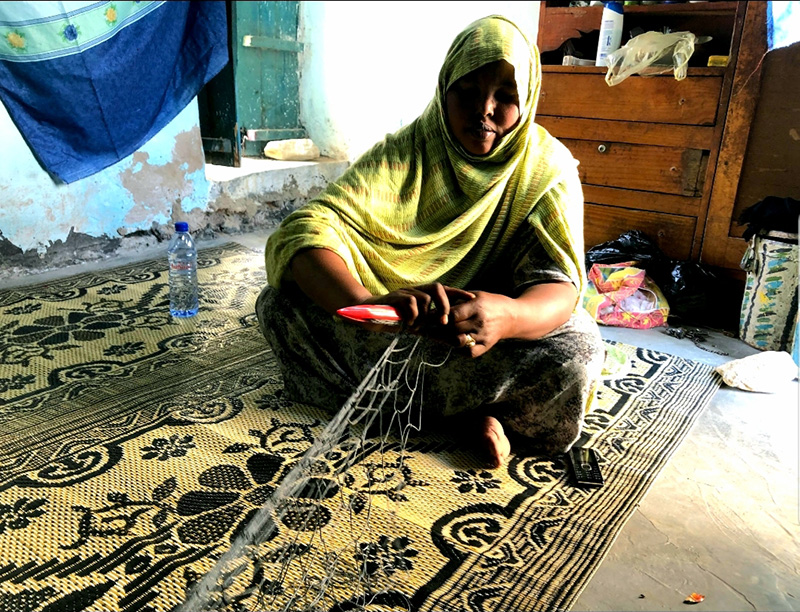 Nadiifo
Nadiifo
The training provided an important foundation for Nadiifo to develop net-making skills. Nadiifo soon began repairing torn nets for local fishers. Once she improved her skills, Nadiifo began to make nets from scratch and now makes two to three per week. Nadiifo has even started traveling to other fishing villages to sell and repair nets. She has taught ten women in her community how to make nets and is continuing to train others.
Demand is high and this has been a useful source of income for Nadiifo. She charges a few dollars to make or repair each net and this has enabled her to pay for food, schooling, and clothes for her children.
Bauxo
Bauxo comes from a fishing family and notes, “As a family, we are fully dependent on fishing. We don’t have any other livelihood income besides fishing.” Before the net-making training, her husband and sons would have to purchase nets, but Bauxo’s newly acquired skill is saving her family money. She is able to repair their torn nets and make new nets when necessary. Bauxo has now trained six women in her community in net-making.
Women face unique challenges in their roles along the fisheries value chain. They experience cultural, policy, and legal barriers to their employment. Compared to men, women have fewer opportunities to learn new techniques, and women and minority groups also face significant obstacles to accessing investment income. Somali women also grapple with threats to their physical safety in this male-dominated sector, and some worry about being assaulted in work environments that don’t have safety measures in place for women. But many, including Bauxo and Nadiifo, are also observing positive changes for women as the Somali region develops its fishing sector after years of conflict.
Nadiifo emphasizes that women can occupy critical roles in the Somali fisheries sector, especially in pre- and post-harvest work. The opportunities and the complex challenges facing women in the Somali fishing sector require solutions that invest in them, such as small loans for women in the sector, training in fisheries sustainability and technical skills like fish processing, and prioritization of women’s safety. Through these efforts, women net-makers can become not only visible, but integral to a thriving fishing economy in the Somali region.
Waxa qoray Laura Burroughs iyo Mustafa Mohamoud
Sawirada kalluumaysatada Soomaaliyeed ayaa inta badan muujiya iyaga oo biyaha kasoo jiidaya shabaga kalluunka kuna ridaya doomahooda. Muuqaaladan waxa aan ka muuqan dadka mas'uulka ka ah sameynta iyo dayactirka shabagyadaas, kaas oo ah adeeg ay inta badan bixiyaan haweenku, isla markaana qeyb muhiim ah ka ah dhaqaalaha kalluumeysiga. Si kastaba ha noqotee, bulshooyin badan oo xeebaha dega ayay xirfadani ka maqan tahay, kalluumeysatooyin badana waxay ku khasbanadaan inay boqolaal kiiloomitir ugu safraan magaalooyinka waaweyn si ay u iibsadaan shabagyo ama xitaa si dayactir loogu sameeyo shabagyadooda. Dhibaatadan waxa sii xumeeyey xadidaada isu-socodka ee inta uu jiro COVID-19. Dhisidda xirfadaha sameynta iyo dayactirida shabaga ee haweenka bulshooyinka kalluumaysiga ayaa faa'iido u leh deegaanka iyada oo siisa haweenka dakhli ay ku taageeraan qoysaskooda; taas oo raggana u saamaxda in ay waqti badan ku bixiyaan adeegsiga shabagyadaas isla markaana uu yaraado wakhtigii ay ugu safri jireen dayactirida.
Sannadkii 2019, bulshada degmada Bander Beyla, Puntland ayaa fursad u helay tababarka sameynta shabagyada. Tababarka oo socday muddo sideed-maalmood ah ayaa waxaa ugu ka qeybgalay haweenka waxaana uu qeyb ka ahaa hindisaha maamul-wadaaga kalluumeysiga ee bulshada si looga taageero in waaxda kalluumeysiga iyo dhaqaaluhu ay noqdaan kuwo wanaagsan oo waara Xubnaha bulshada ayaa muujiyey in loo baahanyay in la haqab tiro baahida deegaanka ee shabagyada iyo dayactirka. Tababarka waxa hogaaminaysay haweeney soomaaliyeed oo khibrad qoto-dheer u leh sameynta shabagyada.
Tababarka waxa sidoo kale ku jiray qeybta "tababar tababarayaasha" taas oo laba ka qeybgale ay ku barteen sida dadka kale ee ka tirsan bulshadooda loo baro xirfada, kor u qaadista faa'idada hal tababar iyo ballaarinta fursadaha ganacsi ee haweenka hawshan qabta. Shaqaalaha deegaanka ee Secure Fisheries ayaa dhowr bilood kadib dabagal ku sameeyay laba kamid ah ka qeybgalayaasha si ay u arkaan sida uu tababarku u anfacay iyaga iyo bulshooyinkooda.
 Nadiifo
Nadiifo
Tababarku wuxuu Nadiifo siiyay sees muhiim ah oo ay ku horumariso xirfadaha shabag sameynta. Nadiifo waxyar kadib waxay bilowday dayactirka shabagyada dillaacay ee kalluumeysatada deegaanka. Markii ay kobcisay xirfadaheedii, Nadiifo waxay bilowday inay sameyso shabagyada cusub immikana waxay sameysaa laba ilaa saddex shabag toddobaadkiiba. Nadiifo xitaa waxay bilowday inay u safarto tuullooyinka kale ee kalluumeysiga si ay u iibiso una dayactirto shabagyada. Waxay bartay toban haween ah oo ka tirsan bulshadeeda sida loo sameeyo shabagyada waxaanay sii wadaa tababarida qaar kale.
Dalabka ayaa sareeya tanina waxay u ahayd Nadiifo il dakhli oo waxtar leh. Waxay daallacdaa dhowr doollar si ay u sameyso ama u dayactirto shabag kasta taasina waxay u sahashay inay bixiso cuntada, dugsiga, iyo dharka carruurteeda.
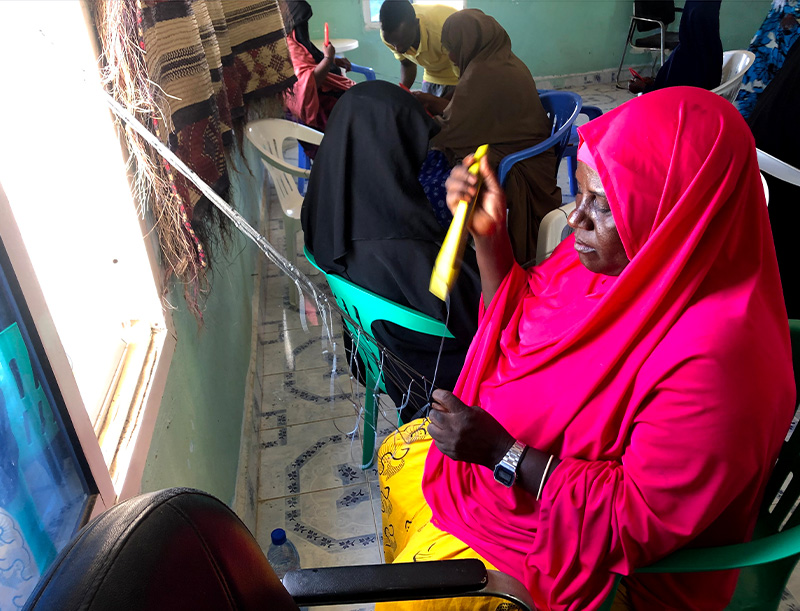 Bauxo
Bauxo
Bauxo waxay kasoo jeedaa qoys kalluumaysato ah wuxaanay xustay, “Qoys ahaan, waxaan si buuxda ugu tiirsanahay kalluumeysiga. Ma lihin dakhli kale oo nololeed oo aan ahayn kalluumeysiga. ” Kahor tababarka sameynta shabaga, ninkeeda iyo wiilasheedu waxay ku khasbanaayeen inay soo iibsadaan shabagyada, laakiin xirfadda cusub ee ay baratay Bauxo ayaa lacagta u madhxisay qoyskeeda. Waxay awood u leedahay inay dayactirto shabagyadooda dillaacay iyo in ay sameyso shabagyo cusub markii loo baahdo. Bauxo waxay hadda lix haween ah oo ka tirsan bulshadeeda ku tababartay sida loo sameeyo shabaga.
Haweenku waxay la kulmaan caqabado gaar ah oo la xiriira doorarkooda silsilada kalluumeysiga. Waxay la kulmaan cabaqado dhaqan, siyaasadeed, iyo sharci oo la xiriira shaqadooda. Marka la barbardhigo ragga, haweenku waxay helaan fursado kooban oo ay ku bartaan farsamooyinka cusub, sidoo kale, haweenka iyo kooxaha laga tirada badan yahay waxay la kulmaan caqabado waaweyn oo la xiriira helitaanka dakhliga maalgashiga. Haweenka Soomaaliyeed sidoo kale waxay la tacaalaan hanjabaadaha ka dhanka ah badbaadooda ee kaga yimaada qeybtan ay raggu maamulaan, qaarkoodna waxay ka werweraan in lagu weeraro jawiyada shaqo ee aan lahayn tallaabooyinka badbaadada ee loogu talagalay haweenka. Laakiin qaar badan, oo ay kamid yihiin Bauxo iyo Nadiifo, ayaa sidoo kale isbeddelo wanaagsan u sameeyay haweenka inta ay mandaqada Soomaaliya horumarinayso qeybteeda kalluumeysiga kadib sannado badan oo colaado ah.
Nadiifo ayaa ku nuuxnuuxsatay inay haweenku kaalin muhiim ah ka ciyaari karaan qeybta kalluumeysiga ee Soomaaliya, gaar ahaan howsha kahor iyo kadib kalluumeysiga. Fursadaha iyo caqabadaha adag ee haysta haweenka ku jira qeybta kalluumeysiga ee Soomaaliya waxay u baahan yihiin xalal maalgashada iyaga, sida deyn yar oo loogu talagalay haweenka ka shaqeeya qeybta, tababar ku saabsan waarida kalluumeysiga iyo xirfadaha farsamo sida diyaarinta kalluunka, iyo ahmiyad siinta badbaadada haweenka. Marka la sameeyo dedaalladaas, haweenka shabagyada sameeya kaliya ma noqon doonaan kuwo muuqda balse waxay noqon doonaan qeyb muhiim ah oo kamid ah dhaqaalaha kobcaya ee kalluumeysiga ee mandaqada Soomaalida.
At the UN75 Global Governance Forum on September 17th, Secure Fisheries will announce the partnership “Developing a Cold Chain Infrastructure for the Somali Fishing Industry,” which brings together the private sector, government, and civil society to address the challenge of low profit margins, poor seafood quality, and limited market size in Somali fisheries.
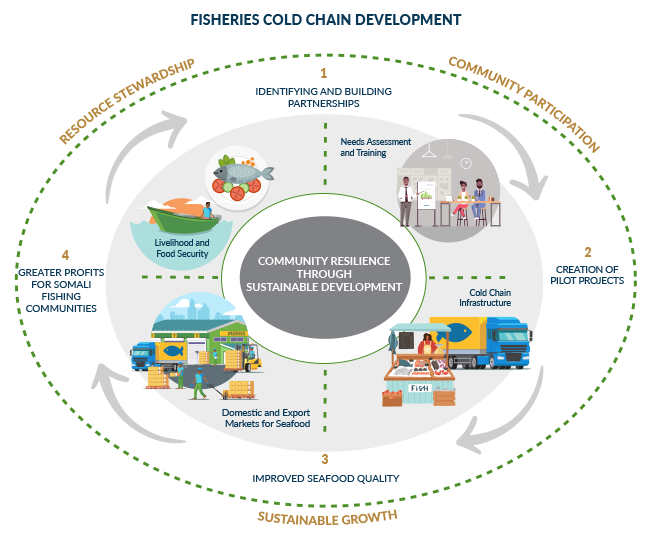
This diagram has been designed using resources from Freepik.com
The Somali marine environment has the potential to produce hundreds of millions of dollars of seafood each year while providing high quality protein to a country facing famine and drought. One Earth Future, the Somalia Seafood Exporters Association, the Global Cold Chain Alliance, and the Italian Agency for Development Cooperation have teamed up with the Ministries of Fisheries in Somalia and the state of Puntland to develop a pilot project combining technical training, best practices, infrastructure such as solar-powered cold storage, and data collection in Somali fishing communities.
Our aim is to provide efficient, low-cost technology and skills to fishing communities and seafood companies to develop the domestic market for seafood while improving processing quality to open up export markets. By reducing spoilage and increasing profits, this project promotes coastal livelihoods and sustainable use of the marine environment, pillars of SDG 14. The Cold Catch project advances the global call contained in the UN75 Declaration by strengthening the resilience of Somali coastal communities as they prepare for the unexpected effects of climate change.
THE UN75 GLOBAL GOVERNANCE FORUM
One Earth Future Foundation and a group of other institutions is hosting the UN75 Global Governance Forum, designed to facilitate discussion on issues of critical importance such as inclusive rural development, peace building, human rights, climate change and gender equality. The Forum will provide a virtual meeting space to bring together organizations from around the world to develop innovative proposals to address these issues. It is gathering diverse entities from civil society, the private sector, philanthropic organizations, academia, and other institutions to join the global conversation initiated by the United Nations in the context of its 75th anniversary. The Forum’s goal is to forge the design and implementation of strategies to address the increasingly complex problems arising today and in the coming years.
SCALABLE PARTNERSHIPS FOR THE FUTURE WE WANT
The UN75 Global Governance Forum is organized around four thematic pillars: Peace and Security, Sustainable Development, Human Rights and Humanitarian Action, and Climate Governance. Across them, plenary presentations and breakout groups will catalyze new forms of multi-stakeholder partnerships to develop proposals, scalable and replicable, that will contribute to fulfilling the official commitments of the UN75 Intergovernmental Declaration.
Find out more about the UN75 Global Governance Forum and register here to participate in its different meetings.
In an important milestone in the development of cooperative fisheries management in Bander Beyla, Puntland, the Director General of Puntland's Ministry of Fisheries and Marine Resources, the Chief of the Ceenaad Fishing Cooperative of Bander Beyla, and Secure Fisheries’ Puntland field manager signed a power-sharing agreement on October 5 officially establishing the first co-management association in the Somali region. The power-sharing agreement formalizes a partnership between fisheries resource users in Bander Beyla and the Government of Puntland, with Secure Fisheries committing to a supportive role for the association. Members of the Puntland Minister of Fisheries and Marine Resources and a number of fisheries resource users from Bander Beyla District were also in attendance at the signing.
Stipulations of the agreement were decided upon during an August 13 meeting, with each party committing to different roles and responsibilities. The agreement is an important step toward improving fisheries management and livelihoods and managing and preventing resource conflict. Secure Fisheries looks forward to supporting the new co-management association.
by Mohamed Mohamud Abdullahi
“When COVID-19 came and the fish market disappeared, it was as if our lives also stopped. The only source of livelihood I had known for years ceased. We held hopes that God would provide for us and somehow we would survive. However, with each passing day, seeing our catch waste away, things could not get any worse. For women-headed households like myself, who must find daily livelihood for my five children, things turned for the worse,” says Khadra.
Khadra owns a fishing boat in the coastal town of Bander Beyla, Somalia. Her livelihood was abruptly interrupted by the COVID-19 pandemic and the closure of the international fish market. She depended entirely on trading fish to eke out a living for herself and her family. The fish that Khadra traded was largely shipped to Yemen and Dubai, the largest markets for fish from Bander Beyla. However, with restrictions emanating from the pandemic, the markets closed, threatening the livelihood of not only Khadra, but thousands of people and households that depend on fishing.
Bander Beyla is a coastal community in the Bari region of Puntland, a Federal State in Somalia. About 70 percent of household income in the community is derived from fisheries. As such, proceeds from fish-centered businesses control the local economy, from transporters to small shops, schools, and food markets. Any impediments to the sector affect not only individual households, but the entire community.
With no reliable cold-chain facilities available to preserve the catch for long periods, Bander Beyla’s fishing community had pinned their hopes on the fast-moving nature of the lucrative fish markets in Dubai and Yemen. When those markets closed, fisherfolk faced huge losses. The lack of durable cold storage facilities meant fresh harvest would spoil before reaching local markets. A majority of the local fishers, including traders, fishers, fishmongers, and boat owners, were forced to either downscale their operations with the economic downturn or stop their fishing activity altogether.
While the domestic market could provide another avenue for selling fish and relieve some of the pain from closed international markets, the high cost of energy has been an impediment to expanding the fisheries value chain inland. Fishers in Bander Beyla already spend almost 70 percent of their total working capital per voyage for electricity and fuel, making the additional cost to transport fish inland to domestic markets unconscionable.
To support the fishing industry and the local community, Secure Fisheries partnered with the Ceenaad Fishing Cooperative of Bander Beyla—a collective of unionized traders, fishers, boat owners, and fishmongers whose aims is to maximize the potential of the fishing industry and strengthen the socioeconomic benefits to fishers and fisheries sector workers—to install a solar-powered refrigerator in Bander Beyla. The project aimed to provide storage facilities for fish, thereby reducing loss and enabling fishers and traders to expand their markets. The refrigerator has the capacity to hold 240 kilograms of fish and can be adjusted from refrigerator to freezer. The whole system runs entirely on renewable energy and consists of solar panels, a solar charge controller, a battery, the electrical load, and the fridge. This helps the Ceenad Cooperative maintain cost-effective fish storage and supply fish to domestic markets as an alternative source of income to replace the currently inaccessible export markets.
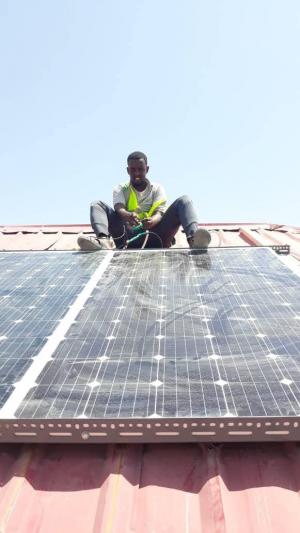
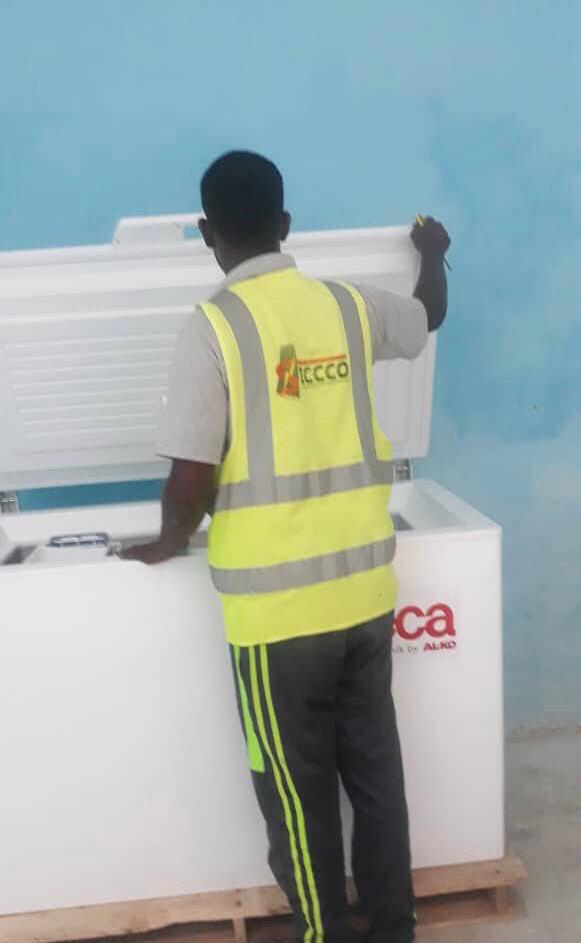
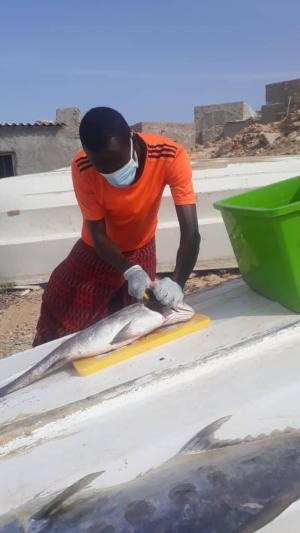
Bander Beyla fishers, who were idle with no market to supply, resumed fishing as soon as the refrigerator was installed, and they began shipping the fish to inland cities using refrigerated trucks. Since the installation, they have sold fish in booming inland markets like Qardho and Garowe. They transport fish at least four times a week to different fish kiosks, hotels, and small-scale traders. Now, the local fish market has expanded and has successfully replaced the lost overseas market.
This success offers growing potential, underscoring the demand of the local market. According to Ceenaad Fishing Cooperative of Bander Beyla chairman Said Farah, “There is still demand in the local markets and the capacity of the refrigerator provided to the community is small; there is need for more cost-effective solar-powered cold-chain infrastructure like blast freezers, ice makers, refrigerated trucks, and technical training on maintenance to sustain this equipment.” Along with proper fisheries management, the expansion of sustainable cold-chain infrastructure could have strong ripple effects on food security, employment, and incomes for Somali fishing communities.
Members of the newly formed fisheries Co-Management Association (CMA) in Bander Beyla participated in a business administration training facilitated by Secure Fisheries, the mayor of Bander Beyla, and the chairman of the Cenaad Fishing Cooperative. The training covered business planning, marketing, and budgeting and cost calculations, and it employed group simulations. These skills were also applied to managing the CMA, covering meeting management, office administration, and managing finances. The topics are critical to improving livelihoods in the fishing community and running an effective CMA.
Maritime and geography experts came together virtually for Geography 2050: The Future of the World Ocean, a symposium hosted by the American Geographical Society. Secure Fisheries staff contributed five-minute lightning presentations during exciting sessions on Oceans as a Contested Environment and Exploring, Mapping, and Sensing the Ocean. Researcher Colleen Devlin presented the Fisheries Conflict Database, and Research Associate Paige Roberts presented Project Badweyn. Their work contributed to the increasingly important strategic dialog about ocean life, maritime networks, humanity's reliance on the services the ocean provides, and how changes in the ocean impact all life above and below water. The recorded presentations are available in the video vault on the conference website, and direct links to view content from Colleen Devlin and Paige Roberts are also available.
Article Details
Published
Written by
Topic
Program
Content Type
Opinion & Insights